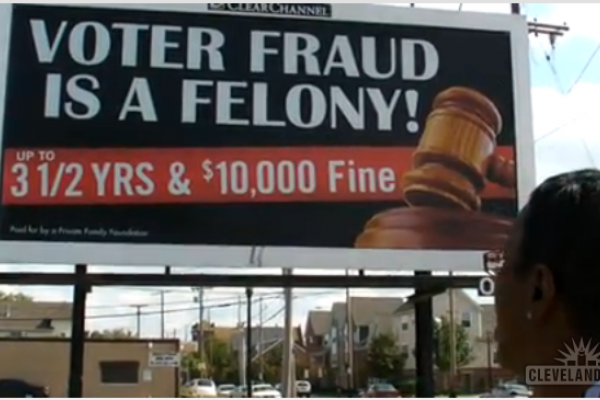Fraud is a strong word. Webster's defines fraud as deceit and trickery, and an "intentional perversion of truth in order to induce another person to part with something of value or to surrender a legal right." Fraud is a serious matter.
The word "fraud" is on billboards around Ohio. I started noticing this a few weeks ago, when I was driving through a working class African American community in Cleveland and noticed a billboard that read: "Voter Fraud is a Felony: 3 1/2 years & $10,000 fine."
The red-and-black sign is accented by a large gavel in the lower right hand corner. A few days later, I noticed a similar billboard in Dayton, and late last week saw two such billboards near my home in urban Cincinnati. In an election season that has seen more jockeying around voter fraud and voter suppression than any in my memory, these billboards caught my eye.
Voter fraud sure sounds horrible, and based on these billboards in Ohio, one would imagine that it is an epidemic. After all, one of the hallmarks of American democracy is our fair and free elections.
But the billboards quickly created dissonance for me based on a recent meeting I and other pastors from Ohio Prophetic Voices enjoyed with Ohio Secretary of State John Husted. During the meeting, Husted told us that voter fraud is extremely rare and almost nonexistent. Statistics back up Husted's contention.
So if voter fraud is almost nonexistent, why is a private anonymous family foundation spending significant cash in a swing state like Ohio in communities of color?
The only conclusion I'm left with is that the billboards themselves represent the only true fraud going on here in Ohio. The billboards are meant to intimidate, to create fear, to make voting seem dangerous. In a state in which returning citizens or people with past felony convictions are allowed to register and vote, the billboards subliminally communicate the opposite, particularly for a driver catching the sign through peripheral vision. Felony ... Vote ... Fraud ... 3 1/2 years in prison and a $10,000 fine.
If fraud is the "intentional perversion of truth in order to induce another person to part with something of value or to surrender a legal right," then these billboards are an example of fraud, an deceitful investment to try to get low income people of color to give up the valuable right to vote out of fear or misinformation.
The Psalmist says regarding the wicked in Psalm 36:3-4: "The words of their mouths are mischief and deceit; they have ceased to act wisely and do good. They plot mischief while on their beds; they are set on a way that is not good; they do not reject evil."
This attempt to intimidate and commit fraud on the people of Ohio through an exaggerated crisis targeting communities of color is an affront to God and to people of faith. I ask you to join me in pleading with this private family foundation to repent and pull down these billboards. I ask you to join me in pleading with the billboard companies to repent by saying no to the money they have received to place these signs.
Stop the Fraud, Do Good, Take Down the Billboards!
Troy Jackson is senior pastor of University Christian Church in Cincinnati, a graduate of Princeton Theological Seminary, and earned his PhD in United States history from the University of Kentucky. He is author of Becoming King: Martin Luther King Jr. and the Making of a National Leader (Civil Rights and the Struggle for Black Equality in the Twentieth Century) and a participant in Sojourners' Windchangers grassroots organizing project in Ohio. Learn more about organizing around Ohio jobs. This article first appeared on the Huffington Post.
Got something to say about what you're reading? We value your feedback!
